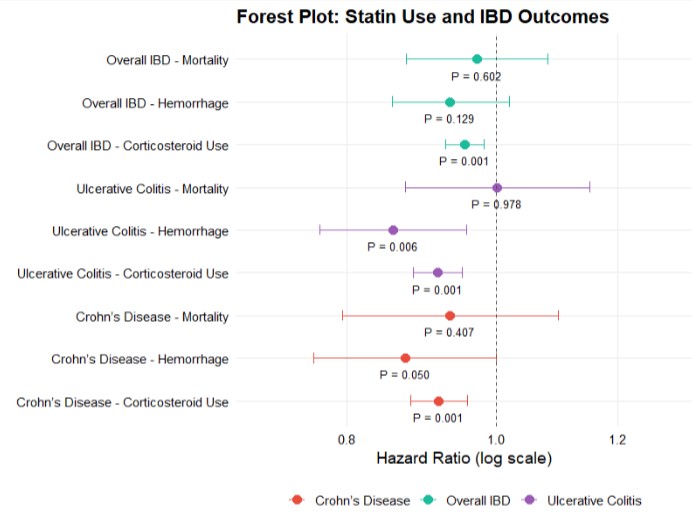Sunday Poster Session
Category: IBD
P1171 - Association of Statin Therapy With Inflammatory Bowel Disease Outcomes: A Real-World Evidence From a National Cohort
Sunday, October 26, 2025
3:30 PM - 7:00 PM PDT
Location: Exhibit Hall
- SP
Sandesh Parajuli, MD
Reading Hospital
Allentown, PA
Presenting Author(s)
Sandesh Parajuli, MD1, Shivam Singh, MD2, Bidisha Baral, MD3, Viraj Shah, MBBS4, Divya Samat, MD2, Fnu Vikash, MD5, Anish Paudel, MD2, Anthony Donato, MD6
1Reading Hospital, Allentown, PA; 2Reading Hospital, Reading, PA; 3Saint Agnes Hospital, Baltimore, MD; 4Augusta University, Reading, PA; 5Cleveland Clinic Foundation, New York, NY; 6Reading Hospital, Tower Health, Reading, PA
Introduction: Inflammatory bowel disease (IBD), comprising Crohn’s disease (CD) and ulcerative colitis (UC), is a chronic immune-mediated disorder. Statins, widely used for cardiovascular prevention, exhibit anti-inflammatory and immunomodulatory properties, which may benefit IBD patients.
Methods: We conducted a retrospective observational cohort study using the TriNetX U.S. Collaborative Network (2018–2024). Adult patients (≥18 years) with IBD were identified and divided into two cohorts: those receiving ≥1 year of statin therapy and those without statin use. Patients with prior antiplatelet/anticoagulant therapy were excluded. Propensity score matching was performed (1:1) across 21 variables. Primary outcomes included corticosteroid use and gastrointestinal hemorrhage, with all-cause mortality as a secondary outcome.
Results: After matching, 35,350 patients (17,675 per cohort) were analyzed. Corticosteroid use was significantly lower in the statin group (54.2% vs. 56.4%, OR: 0.917, P< 0.001; HR: 0.955, 95% CI: 0.928–0.982, P=0.001). Gastrointestinal hemorrhage occurred in 5.5% (statin) vs. 5.9% (non-statin) (P=0.148). Mortality was similar (3.9% vs. 4.0%, P=0.701). CRP levels were lower in statin users (15.83 vs. 20.76 mg/L, P< 0.001).
In the CD subgroup (n=15,622), corticosteroid use was lower in statin users (53.5% vs. 57.0%, HR: 0.918, P< 0.001); hemorrhage showed borderline significance (5.0% vs. 5.8%, P=0.037; HR: 0.873, P=0.050), with no mortality difference. In UC patients (n=21,530), corticosteroid use (52.7% vs. 56.1%, HR: 0.917, P< 0.001) and hemorrhage (5.6% vs. 6.5%, HR: 0.858, P=0.006) were significantly lower in the statin group, with similar mortality (3.8% each).
Discussion: Statin use was associated with reduced corticosteroid use across all IBD types and lower GI hemorrhage in UC and CD. These findings support a potential therapeutic role for statins in IBD management.

Figure: Forest plot illustrating the association between statin use and key clinical outcomes among patients with inflammatory bowel disease (IBD), including overall IBD, ulcerative colitis, and Crohn’s disease subgroups.
Disclosures:
Sandesh Parajuli indicated no relevant financial relationships.
Shivam Singh indicated no relevant financial relationships.
Bidisha Baral indicated no relevant financial relationships.
Viraj Shah indicated no relevant financial relationships.
Divya Samat indicated no relevant financial relationships.
Fnu Vikash indicated no relevant financial relationships.
Anish Paudel indicated no relevant financial relationships.
Anthony Donato indicated no relevant financial relationships.
Sandesh Parajuli, MD1, Shivam Singh, MD2, Bidisha Baral, MD3, Viraj Shah, MBBS4, Divya Samat, MD2, Fnu Vikash, MD5, Anish Paudel, MD2, Anthony Donato, MD6. P1171 - Association of Statin Therapy With Inflammatory Bowel Disease Outcomes: A Real-World Evidence From a National Cohort, ACG 2025 Annual Scientific Meeting Abstracts. Phoenix, AZ: American College of Gastroenterology.
1Reading Hospital, Allentown, PA; 2Reading Hospital, Reading, PA; 3Saint Agnes Hospital, Baltimore, MD; 4Augusta University, Reading, PA; 5Cleveland Clinic Foundation, New York, NY; 6Reading Hospital, Tower Health, Reading, PA
Introduction: Inflammatory bowel disease (IBD), comprising Crohn’s disease (CD) and ulcerative colitis (UC), is a chronic immune-mediated disorder. Statins, widely used for cardiovascular prevention, exhibit anti-inflammatory and immunomodulatory properties, which may benefit IBD patients.
Methods: We conducted a retrospective observational cohort study using the TriNetX U.S. Collaborative Network (2018–2024). Adult patients (≥18 years) with IBD were identified and divided into two cohorts: those receiving ≥1 year of statin therapy and those without statin use. Patients with prior antiplatelet/anticoagulant therapy were excluded. Propensity score matching was performed (1:1) across 21 variables. Primary outcomes included corticosteroid use and gastrointestinal hemorrhage, with all-cause mortality as a secondary outcome.
Results: After matching, 35,350 patients (17,675 per cohort) were analyzed. Corticosteroid use was significantly lower in the statin group (54.2% vs. 56.4%, OR: 0.917, P< 0.001; HR: 0.955, 95% CI: 0.928–0.982, P=0.001). Gastrointestinal hemorrhage occurred in 5.5% (statin) vs. 5.9% (non-statin) (P=0.148). Mortality was similar (3.9% vs. 4.0%, P=0.701). CRP levels were lower in statin users (15.83 vs. 20.76 mg/L, P< 0.001).
In the CD subgroup (n=15,622), corticosteroid use was lower in statin users (53.5% vs. 57.0%, HR: 0.918, P< 0.001); hemorrhage showed borderline significance (5.0% vs. 5.8%, P=0.037; HR: 0.873, P=0.050), with no mortality difference. In UC patients (n=21,530), corticosteroid use (52.7% vs. 56.1%, HR: 0.917, P< 0.001) and hemorrhage (5.6% vs. 6.5%, HR: 0.858, P=0.006) were significantly lower in the statin group, with similar mortality (3.8% each).
Discussion: Statin use was associated with reduced corticosteroid use across all IBD types and lower GI hemorrhage in UC and CD. These findings support a potential therapeutic role for statins in IBD management.

Figure: Forest plot illustrating the association between statin use and key clinical outcomes among patients with inflammatory bowel disease (IBD), including overall IBD, ulcerative colitis, and Crohn’s disease subgroups.
Disclosures:
Sandesh Parajuli indicated no relevant financial relationships.
Shivam Singh indicated no relevant financial relationships.
Bidisha Baral indicated no relevant financial relationships.
Viraj Shah indicated no relevant financial relationships.
Divya Samat indicated no relevant financial relationships.
Fnu Vikash indicated no relevant financial relationships.
Anish Paudel indicated no relevant financial relationships.
Anthony Donato indicated no relevant financial relationships.
Sandesh Parajuli, MD1, Shivam Singh, MD2, Bidisha Baral, MD3, Viraj Shah, MBBS4, Divya Samat, MD2, Fnu Vikash, MD5, Anish Paudel, MD2, Anthony Donato, MD6. P1171 - Association of Statin Therapy With Inflammatory Bowel Disease Outcomes: A Real-World Evidence From a National Cohort, ACG 2025 Annual Scientific Meeting Abstracts. Phoenix, AZ: American College of Gastroenterology.
